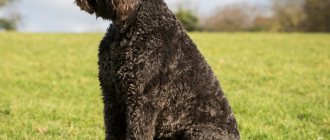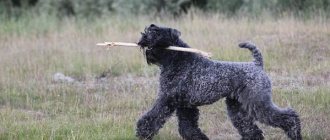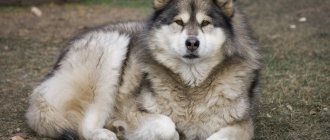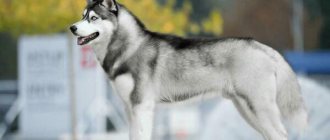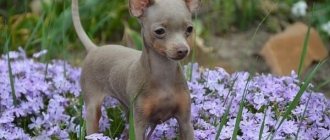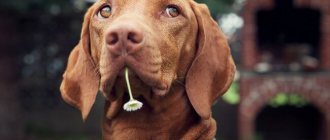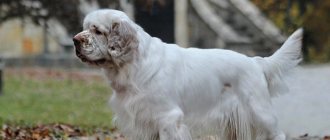History of the origin of the Kerry Blue Terrier
The Kerry Blue Terrier has a cheerful disposition.
The exact history of the origin of such dogs is unknown. Biologists have put forward theories that Kerry Blue Terriers originally lived in Ireland. Dogs were owned by farmers and used to hunt rats. That is why, until the twentieth century, the breed was not particularly popular and did not arouse much interest among people.
It is believed that the ancestors of these dogs were soft-coated wheaten terriers, Bedlington terriers, Irish wolfhounds, and various peasant dogs.
People first started talking about animals in 1847, and in 1913 dogs took part in an exhibition held in Ireland.
After another 7 years, the first club of such dogs appeared in Dublin. For reference! The Kerry Blue Terrier breed received international recognition only in 1922.
After 8 years, pets have become popular all over the world due to their excellent qualities.
general characteristics
Kerry Blue Terrier dogs were bred in County Kerry, Ireland. This explains the first part of the name. The word "blue" refers to the unusual bluish color of the coat. Previously, these dogs were used as shepherds, hunters, they exterminated rats, and guarded the house. Now it is the ideal companion for active owners. The breed is a symbol of Ireland, the country's national pride.
The all-purpose work these terriers did in the past has influenced their character. These are smart, independent, hardy and brave dogs. They can guard the house, exterminate rats on the property, hunt birds and small game. They are very attached to their owner and family members, treat everyone kindly, and love children. This dog can become a devoted companion.
| Options | Characteristic |
| breed name | Kerry Blue Terrier |
| a country | Ireland |
| breed group | terriers |
| life expectancy | 12-15 years |
| height | 44-49 cm |
| weight | 15-18 kg |
| aggressiveness | not aggressive towards humans |
| activity | needs high physical activity |
| intelligence | smart, quick-witted |
| care | requires special grooming, although does not shed much |
pros
Irish Blue Terriers are popular due to their good-natured, cheerful character and original appearance. This funny, playful dog is ready to accompany his owner everywhere, amusing him with his antics. Representatives of the breed are unpretentious, do not require serious care and live quietly both in a private house and in a city apartment. They have several more advantages:
- smart, quick-witted;
- cheerful, active and playful;
- loyal, sociable;
- get along well with children;
- can guard the house;
- the wool hardly sheds, does not smell, does not cause allergies;
- have good health and long life expectancy.
Minuses
This breed is not suitable for people with a soft character and inexperienced in raising terriers. If a pet is not given enough attention and education from an early age, it can grow up arrogant and uncontrollable. These dogs have several other disadvantages that can become a problem:
- prone to dominance;
- can be stubborn and headstrong;
- they love to gnaw everything, dig the ground;
- come into conflict with other dogs;
- They do not get along well with pets because they see them as prey.
Interesting videos complement the description of these dogs:
Video: Kerry Blue Terrier. Pros and cons, price, how to choose, facts, care, history
Video: Kerry Blue Terrier. Breed characteristics, care
Interesting Facts
There are many interesting facts related to Kerry Blue Terriers. The most famous are the following:
- This is a multifunctional breed that is used to guard livestock and property of farmers, and hunt various game and birds.
- Dogs with dark coat colors are especially popular at exhibitions, so more and more such animals are being bred. Despite this, light-colored pets are not considered a bad breed.
- The breed has a second name - Irish Blue Terrier.
For reference! Due to its weak distribution in Russia, the name of the breed is often distorted: for some it is a one-word Cary Blue Terrier, for others it is a Carrie or Kerry Bull Terrier.
Puppies may be black, which will later change to standard.
Vaccinations
Kerry blue terriers are first vaccinated at 8-9 weeks with a complex vaccine against:
- carnivore plague;
- hepatitis A;
- parainfluenza;
- viral enteritis.
To strengthen immunity, after 21 days the animals are revaccinated with the addition of a vaccine against leptospirosis. After the end of the teeth change (at 7 months), an anti-rabies injection is given.
The veterinarian has the right to change the vaccination schedule, guided by the condition of the pet and the epidemiological situation in a certain area.
Adult dogs are vaccinated every year, dewormed once every 3 months, and treated against fleas and ticks in the warm season. Information about vaccinations done is included in the veterinary passport.
Breed standard and description
Kerry Blue Terriers are medium in size and have a rather graceful body build. A distinctive feature is the elongated head, while the transition from nose to muzzle is barely distinguishable. It is worth noting that dogs always have a small beard.
There are some breed standards that must be taken into account:
- The body is muscular and compact, the neck is of medium length, and the dog is slender.
- The head is long and narrow.
- The ears are triangular, thin, and fit tightly to the head.
- The eyes are almost always dark, almost black.
- The nose is black, the nostrils are wide.
- The jaws are powerful, strong teeth, the palate and gums are black.
- The stomach is tucked, with a pronounced waist.
- The limbs are straight and parallel.
- The tail is thin and set high.
There is also a standard for the Kerry Blue Terrier coat. It should be soft, wavy, fluffy. If a dog has a rough and hard coat, then this is considered a defect. A distinctive feature is the presence of a thick beard.
The color of dogs can be any shade of blue - from dark steel to light silver. Black markings are allowed. Animals with other color options and white spots are considered defective; they are not used for breeding and do not participate in exhibitions.
Attention! In official sources you can find information that up to one and a half years old dogs can be black or tan, but gradually the color changes to standard.
These dogs are very friendly and love to spend time in company.
How to cut your own hair
A haircut must be performed at least once every three months.
Haircut is a complex procedure that is best left to a specialist.
If this procedure is carried out by the owner independently, then it must be done in accordance with the following description:
- Brush the fur thoroughly first.
- First, cut the hairs short in the area of the ears, temples, crown and throat. Scissors are used to shape the edges.
- To tidy the fur from tail to crown, you need to use a comb and scissors. Brush the dog against the grain.
- The panties area is machined. In this case, the wool is cut short.
- On the paws and underside of the body, the fur retains its length.
- Dog beards and whiskers are not cut, but they are shaped. In this case, it is necessary that as a result the wool faces forward. On the eyebrows you only need to slightly trim the hairs that are too long.
- The lower parts of the paws are processed so that a beautiful silhouette is obtained.
When grooming, it is important to remember that the boundaries between the areas with long and short hair should have a smooth transition. Near the corner of the mouth, a narrow strip leading down is cut. It blends harmoniously with the neck area. The sides of the mouth should be of such length that the fur does not interfere with eating.
Pros and cons of the breed
Dog owners recognize many positive qualities in their pets. These include:
- Friendliness, lack of conflict.
- Sociability, cheerful and playful disposition.
- Devotion to the owner and his family.
- A good attitude towards children, if the latter do not torture the dog.
- Having a sense of self-worth.
- Excellent intelligence, good reaction speed.
- Emotionality and the ability to sense the owner’s mood.
- Having an excellent protective instinct.
However, such pets also have negative qualities, which are also worth knowing before getting a dog. These include:
- touchiness,
- stubbornness,
- clear definition of personal space,
- dislike of small pets and other dogs,
- constant need for communication,
- risk of conflicts with strangers.
In general, with proper upbringing, a dog rarely causes trouble for its owner.
It is important to vaccinate children on time
What types of terriers are there (all dog breeds)
Among the main characteristics, the following facts deserve special attention.
Purpose
What is terrier in French? As stated above, this is a dog that catches burrowing animals. Terriers have quick reactions, rapid movements, and natural flexibility, allowing them to easily overcome narrow spaces. For these qualities, dogs are still used for hunting purposes.
However, as new species were selected, the main purpose of dogs also changed. Modern types of terriers are often classified as decorative breeds. The dogs are distinguished by their miniature size, pleasant appearance, and friendly attitude towards people. They cope well with the role of domestic companions, although natural hunting skills are also not alien to them.
The largest terriers are also used for service. Such individuals protect, work as bloodhounds and search engines, and help in rehabilitation. Thanks to their innate characteristics, terriers have well-developed senses of smell, hearing, focusing and object tracking. Therefore, work activities are not difficult for them.
Appearance
Due to the large number of types of the breed, answering the question of what a terrier dog looks like is not so simple. Nevertheless, several generalized appearance features can be identified:
- Body type. Lean, with developed muscles and powerful limbs. Physical qualities allow terriers to cover long distances and tirelessly perform long-term work.
- Wool. It can be short, long, curly and stiff. Sometimes there is no cover: the individual has only a small fluff on the head and paws. The coat of terriers is not prone to heavy shedding, has hypoallergenic and water-repellent properties (the undercoat does not get wet, and dirt does not stick to the coat).
- Color. All possible breeds of terriers have collected a whole range of colors. The coat of dogs can have dark, reddish, grayish or dazzling white tones.
- Muzzle. Most individuals have a square-shaped muzzle with a small beard. The eyebrows are thick, often the eyes are completely closed - this is protection from the ingress of earth while digging holes.
Most members of the genus are distinguished by excellent health and on average live up to 12-15 years.
Character
Natural hunting abilities influence the terrier's character. These dogs are smart, fearless, and prone to making independent decisions. The most typical signs in terriers include:
- Energetic disposition, increased activity;
- Excitement, playfulness, tendency to hooligan antics (in the absence of discipline);
- Impulsive behavior;
- Tendency to dominate;
- Friendly attitude towards people, moderate aggression towards small animals.
Curbing natural instincts is not so easy, so only experienced and responsible owners can properly maintain hunting dogs. Puppies need early socialization, professional training, and active walking. It is necessary to constantly monitor the behavior of the terrier so that he does not go into “hunter mode” and start chasing cats, small dogs or rodents.
Characteristics and distinctive features of the breed
Kerry Blue Terriers are typical terrier breeds. They have a cheerful and energetic character, love various games and want to participate in all activities.
Note! This breed is very attached to its owner; it tolerates loneliness very poorly, so it is not suitable for those who are often not at home.
Dogs are characterized by stubbornness and self-will; they will perceive only one leader. Pets treat other family members kindly, they can have fun and play with children, provided that the kids do not cross the boundaries of what is permitted.
Animals become excellent guards because they are wary of any stranger. They do not like cats and small rodents; they are quite capable of fighting with other dogs.
What to feed your pet
In order for the dog to grow up happy, healthy and beautiful, it is necessary to think in time about what to feed the Kerry Blue Terrier. The golden character and unique abilities are negated as a result of poor nutrition. The diet must be balanced so that the pet receives the necessary nutrients and minerals. To avoid mistakes, remember the rule that the dog’s body is very different from the human body; you should not feed it with leftovers from the dinner table.
Puppies, like adult pets, need a complete, balanced diet. First of all, you should not give your dogs cooked food. This is especially true for soups. The dishes are useful for humans, but extremely harmful for dogs. You should not treat your dog with sweets and flour products; you should avoid salt. You cannot add cabbage, potatoes, or bread to your diet. It is unacceptable to organize meals based on fatty and smoked foods.
The dog is fed at set hours, and food must be supplied as much as the dog eats; it is recommended to exaggerate or reduce portions only on the recommendation of veterinarians; self-will is unacceptable. Food should not be very hot or too chilled; the ideal temperature is room temperature.
Training and education
It is necessary to begin training and raising Kerry dogs at a young age, otherwise the dog will not obey and will begin to show a bad character.
You can’t shout at the dogs or raise your hand, it’s impossible to achieve anything from them. In addition, the animal will remember everything and will be less likely to make contact afterwards. If the dog has done something wrong, then it is permissible to strictly explain to it what the problem is and immediately show it who exactly is the boss in the house.
Terriers can be stubborn, so training is best done in the form of a game - this way the dog will not get bored.
For reference! Thanks to their high intelligence, dogs quickly remember commands and are easy to train.
Dogs easily remember commands and love to exercise outdoors
Learning ability
Kerry is a very energetic and restless breed, which makes it difficult to train. But they are vital for this breed! And you will have to be patient to establish contact. The owner needs to understand that young Kerry is physically unable to concentrate on training for more than 10 minutes in one walk. It is vital for a dog to run and catch, and not follow commands.
If this is not learned immediately, then irritation will arise between the person and the Blue Terrier, which will reduce their socialization to nothing. The baby will learn all the skills quite quickly, but require long-term concentration and perseverance from him. It is better to find an option where his natural interest will increase. You must show leadership qualities, not dictatorial ones.
Dog health
The distinctive features of the terrier are its good health and excellent immunity. However, it is important to carry out all vaccinations on time. It is recommended to monitor your dog's ears; they are susceptible to various diseases. In addition, pets may have the following problems:
- enteritis,
- hepatitis,
- joint problems,
- oncology,
- cataract and others.
It is also recommended to carry out all the necessary treatment of the dog against parasites in a timely manner.
Nutrition
It is recommended to feed your dog balanced food. Eating from a communal table is not very advisable.
If the owner nevertheless decides to feed the dog natural food, then lean meat, cereals, and fermented milk products are suitable. For the Irish, it is important to receive food at a strictly defined time and in equal portions.
Dog care
Kerry Blue Terriers do not smell, but caring for them is necessary, although not particularly difficult.
Nutrition
The dog's food can be natural and dry. In both cases, it is important that the dog has enough protein and other nutrients. Natural nutrition includes lean meat and fish, cereals, vegetables, and fruits.
Sweets, smoked foods, salty foods, flour, fried foods - these are all prohibited. You cannot feed your dog from the table, otherwise it will develop diseases of the gastrointestinal tract.
It is better to choose dry food together with your veterinarian. It is important that they contain all the necessary vitamins and minerals necessary for the normal development of the animal.
Hygiene
You need to brush your dog at least three times a week with several different brushes. You definitely need to pay attention to your beard, which can contain various debris. Bathing is carried out in case of heavy pollution, not often.
For dogs of this breed, periodic haircuts are important. Pets are not enthusiastic about the procedure, so it is better to entrust it to professionals. It is necessary to monitor the ears, periodically trim the claws, and if necessary, also wipe the eyes with special solutions.
Kerry loves walks and active games
Walks
Kerry Blue Terriers are active dogs, so they need at least two walks a day. It is recommended to play outdoor games with your pet; dogs love them very much. But at the same time, you need to ensure that the dog does not get involved with other animals.
Diseases and care
A healthy and well-groomed Kerry Blue lives with its owners for 12-15 years, but a tendency to a large number of diseases can greatly ruin the dog’s life. Among the most popular diseases in CBT are:
- hip dysplasia;
- entropion of the eyelid;
- dislocation of the kneecap;
- hypothyroidism;
- otitis;
- cataract;
- and even cancer.
The following diseases can be avoided if you provide the animal with proper care:
- Provide your terrier with good exercise every day. Swimming and running are especially valued by the animals themselves; other types are also suitable.
- Groom your coat daily. It is necessary to comb the thick coat every day, and in addition, groom and bathe your pet at least once a month.
- Clean your ears, teeth, and claws regularly. The latter also need to be trimmed periodically.
- The paw pads and eye health of the terrier require especially close attention, as they are the weak point of these dogs. At the first appearance of symptoms of the disease, contact a specialist.
Purchasing a puppy
Puppies of this breed should only be purchased from nurseries. A dog has many standards that a baby must meet. When choosing, you should carefully look at the puppy’s behavior - he should be active and eat well.
Note! The breeder is obliged to provide all the necessary documents for the animal, as well as data on vaccinations performed.
The Kerry Terrier is a wonderful dog that will delight the whole family. This active dog will not let you get bored, it is easy to care for, and it is easy to keep it even in apartment conditions. It is important to monitor your pet’s health and carry out the necessary vaccinations and treatment against parasites on time. It is better to choose a baby in a specialized place so as not to make a mistake.
Feeding: proper terrier diet
It is recommended that protein foods make up the majority of the diet. A dog needs a lot of lean meat products (lamb, chicken breast, veal). There should be at least 300 g of them in the daily menu.
Terrier puppies require a special diet
Terriers can be fed cereals. You can use rice and buckwheat for this. Before eating, they must be boiled well and mixed with protein products.
Vegetables are an essential part of the diet. Their deficiency can cause health problems. Legumes and white cabbage need to be boiled, but other vegetables can be given to the terrier raw.
Important! Of the fermented milk products, only cottage cheese is allowed to give your pet.
Typical diseases of this breed
Blue terriers are famous for their strong immunity, and even common diseases, with proper care, are rare. There are no “prescribed” diseases along the genetic line. Most of them are acquired or age-related.
Common Kerry diseases:
- Otitis;
- Dry eyes;
- Patella dislocation;
- Entropy;
- Keratosis;
- Hypothyroidism;
- Hip dysplasia;
- Cerebellar abytrophy;
- Skin cysts;
- Cataract;
- Cancer.
